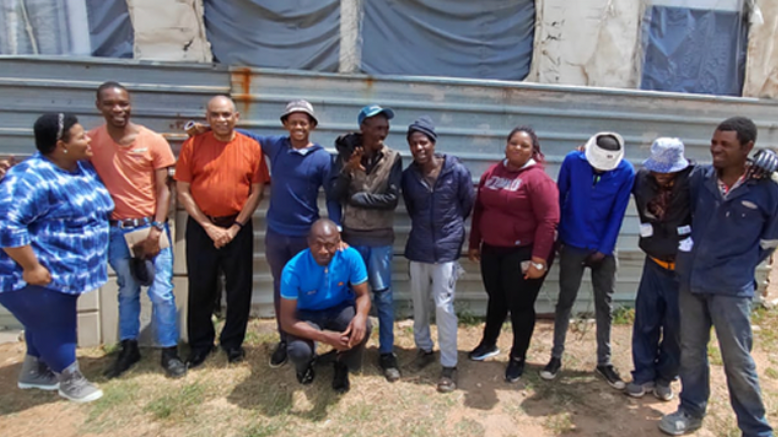New avenues for men’s work in South Africa
The trustbuilding project in South Africa had a visit from Rev Dr Tee Turner to inspire its focus on men further.
Tee's work aligns well with the new focus on men of the trustbuilding work in SA. 'Earlier this year, we decided to focus on men, to engage with them to be the fathers and husbands they need to be,' says Cleo Mohlaodi, National Coordinator of IofC SA. 'Most of the violence in families and relationships comes from men.' Tee addressed four men’s forums, met with pastors and engaged with students at St John’s College, one of SA's top private schools.
At the heart of Tee's message are two guiding principles.
1. His core mission is to help men find their worth. 'If you don't feel your worth, you end up mistreating others,' says Tee. 'When we understand our history, we can begin to understand why people, particularly men, are the way they are.
2. 'Hurting people often hurt other people, particularly those close to them,' he says. 'When we unpack our history, we can use it to heal ourselves and others. When we understand our history, we can see why we are the way we are.'
As a young man, Tee says anger gave him power until he realised that forgiveness gave him greater power. 'Anger doesn't heal us,' he says. 'When you get to the root of your anger, you get to the pain. Then you can work on it and apply different methods to address the underlying issues. You work on it; it works on you. Healing is about trauma and emotion - and everyone in the room is affected by some trauma. The truth is, he adds, that you don't just get past the trauma. 'You learn to live through it. The streets are never far from me, but I learned how to manage this. I never lived until I addressed the trauma in me.'

Each Men’s Forums Tee addressed was unique in its character and needs. The first was a group made up mainly of pastors. Two things came through strongly - their struggle to be vulnerable and to admit they were ‘just men’ and not saints and understanding that love and responsibility for providing for the family are two different things. As Tee puts it: 'The pastors have to work on their healing and learn how to give people real love - something they can only do if they have it within themselves.' Being able to express their feelings has opened up new discussions that will continue.
The forum at Olievenhoutbosch in Pretoria was challenging, as it was a group of recovering drug addicts. But, in Tee’s words, 'These are precisely the kind of men I find most worthwhile to work with.' Their appeal, 'Please help us to find our worth', was heart-rending. Tee’s message was simple: 'Keep your minds hopeful and seek ways to give back to others.' The TBP team will follow up with the participants.

The Forum at Vlakfontein in the south of Johannesburg, ‘What is the pain of a man and how does he discover his worth?’ had the largest group of participants: 28 men. The same issues of the pain of missing fathers, inability to provide for family, homelessness and lack of income dominated discussions. The growing fellowship between the men is starting to form a support group that can help bring encouragement where there now is hopelessness.
The night before he left SA, Tee met with a group of Methodist ministers and churchmen during a two-hour zoom call. Tee’s approach here was different than at the forums. He challenged the group to re-examine their church structures to engage with men in the community around the churches, not just those within the churches, difficult as that might be.
As a result of Dr Turner’s visit, more men’s dialogues will be organised to continue the conversations started.

TBP team member and previous participant Bennett Ndzoko shares his story.
'I was born and raised at Rispark, south of Johannesburg. I had two siblings who both passed away while I was in prison. I could not attend their funeral because the prison authorities denied me permission. My mother raised me well, and my father played little part in my upbringing. I grew up being an innocent young man who didn’t like violence, but I started fighting for myself because of the bullying I experienced. As a result, I became very violent.'
'I became a caddy at South Downs Country Club Golf Course at eleven, where I learnt some bad habits, such as gambling playing dice, stealing, and drinking alcohol. At thirteen, I was already breaking into cars to steal car radios and wheel caps. I later went on to burglary and stealing cars and even went as far as hijackings.'
'In 1995, at nineteen, I got arrested for a crime I committed when I was eighteen. At that time, I was in standard three (grade five). At twenty, I was sentenced to life, plus fifteen years imprisonment, of which I served eighteen years before I was granted day parole in 2013 and full parole in 2014.'
'In prison, I started to change my life. After thorough self-introspection, I engaged myself in educational programmes. I managed to complete my grade twelve senior certificate and went on to complete my National Certificate N6 in Business Management.'
'My turning point was after realising the pain I had caused my mother. It hit me hard. My mother loved me so much; she stood with me throughout my prison sentence. My involvement in life skills greatly impacted me and helped me realise a need to change. When I came out of prison, I started giving talks at schools. I established the Vlakfontein Men’s Forum NPO, where we are working to prevent gender-based violence, working closely with men and offering mentoring programs to young boys.'